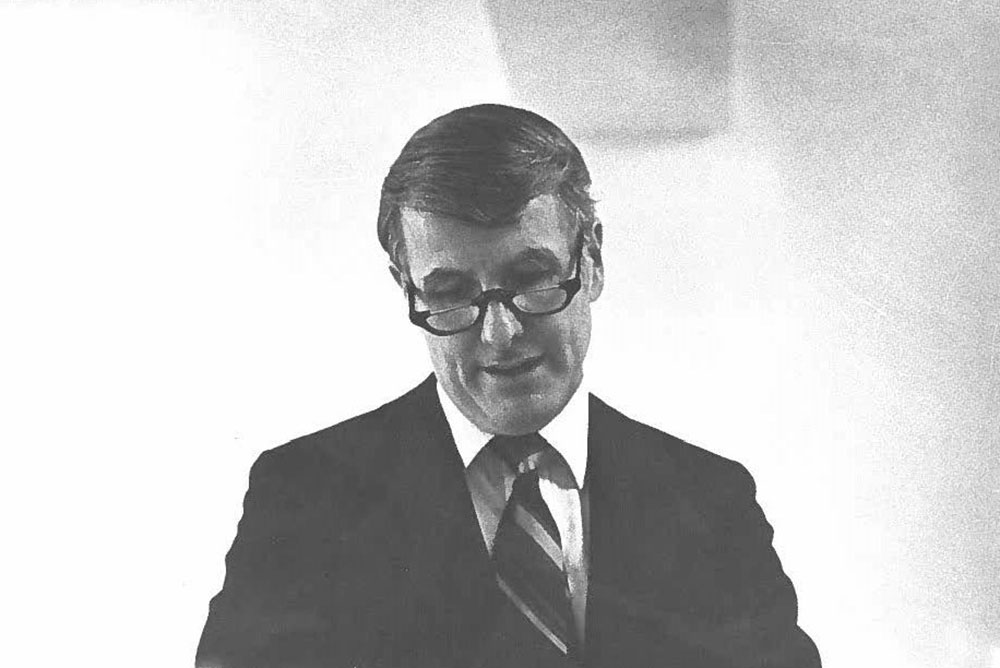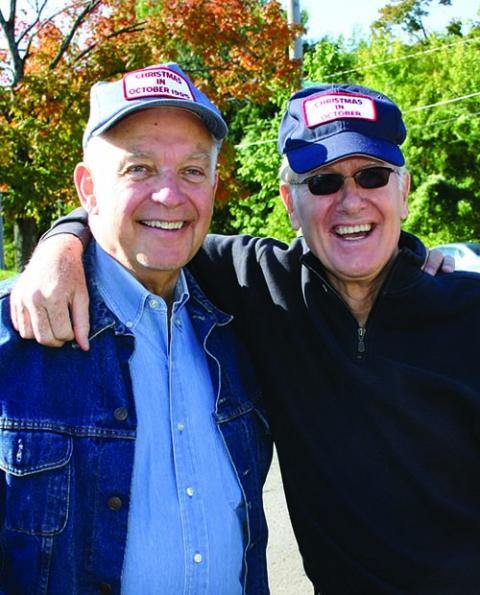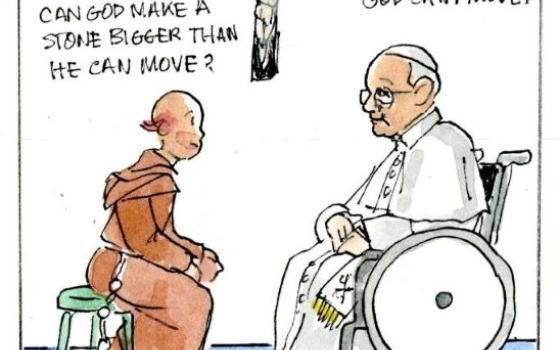
NCR board member John McMeel in 1983 (NCR photo/Pam Bauer)
John McMeel sat in the front row. I went to greet him. I had known John for more than 40 years. He had been one of my father's best friends. Seeing him, I was reminded of my father, who had died a few years earlier.
Although his health had slipped, John greeted me with his characteristic smile. The twinkle in his eyes was undiminished. He said, "You've got this!" and gave me a thumbs-up signal.
I had never had a chance to tell my father of my plans to leave behind the practice of law we had enjoyed together for a quarter of a century to run for mayor of Kansas City, Missouri. John's happy face and his ever-present enthusiasm reminded me of my father and was a reassuring boost as I prepared to address the gathered supporters. John had always been the quintessential cheerleader — promoting and encouraging others. Everything seemed possible when you were with John.
I did not become mayor of Kansas City — probably much to my wife's relief, as it turned out. But John would pop up at subsequent events during the campaign at a time when I knew every outing was an effort for him.
When John died on July 7, a flood of memories came back. Although a generation apart, it was impossible not to feel in John's circle. I don't recall when I first met John — probably in the late 1970s when I was finishing up at the University of Notre Dame, our shared alma mater and always a common touch-point for the two of us.
Many years later, I find myself on NCR's Board of Directors, as John was from 1982 to 1996. Another shared experience. But there were many other shared moments in between these bookends.
John graduated from Notre Dame in 1957. After a year in law school, he transitioned to sales as assistant manager and national sales director of Publishers Hall Syndicate in New York City, selling newspaper features.
On a return visit to South Bend, Indiana, John met Jim Andrews, a student at Notre Dame who was renting a room from John's mother at the family home. When Jim graduated, he had moved to Kansas City as the managing editor for the then-fledgling NCR, just founded in 1964. John soon followed and worked briefly as an assistant editor.
Advertisement
John and Jim later launched Universal Press Syndicate in 1970 from the basement of Jim's home. John, with Jim (and later Jim's widow, Kathy), grew the syndicate into a multifaceted media enterprise. It now comprises Andrews McMeel Syndication, the nation's largest independent newspaper syndicate and a leading digital entertainment provider; Andrews McMeel Publishing, an industry leader with multiple New York Times bestsellers, the nation's top calendar producer, and a greeting card division; and Andrews McMeel Entertainment, its film and television division, with numerous projects in the pipeline.
John helped to attract, nurture and promote such creative minds as Bill Watterson ("Calvin and Hobbes"), Garry Trudeau ("Doonesbury"), Gary Larson ("The Far Side"), Jim Davis ("Garfield"), Tom Wilson ("Ziggy"), "Dear Abby" and Roger Ebert, to name a few.
But I wonder how my hometown and the publishing world might be different without John and Jim's work in helping create NCR.
The Catholic community in Kansas City is a close-knit group, and it did not take John long to weave himself into the fabric of his adopted hometown. By the mid-'70s John and his wife, Susan, and my parents, Dick and Bernadette Miller, became good friends. Between John and Dick, it was hard to know who was the bigger dreamer; but there was no question who was the ultimate promoter. When the two were together, "good trouble" often followed.
John helped to found a local chapter of the 1,100-year-old Order of Malta, a Catholic service organization. My father was his first recruit. Taking to heart the order's call to serve the poor and the sick, John and Dick teamed up in 1984 to start Christmas in October in Kansas City, which each October repairs and refurbishes hundreds of homes for the poor and disabled through the generous work of thousands of volunteers, businesses and labor unions. Since the effort began, it has improved more than 5,000 homes in the Kansas City area.
I was with them that very first year. They originally named the program Christmas in November, consistent with the holiday theme of giving thanks and giving back. John's promotion of the event exceeded the execution. The event did not actually occur until a bitterly cold Dec. 1.

Dick Miller, left, with John McMeel (Courtesy of Steve Miller and Andrews McMeel Universal)
The pair quickly determined that for all marketing appeal of November, the more temperate month of October was a much better choice.
It was also quickly apparent just how huge an undertaking it would be to attract the necessary resources to realize the vision. I was there as we hustled to borrow a few pickup trucks and recruit college students from our nearby Jesuit university, Rockhurst.
For the next 30 years, this dynamic duo helped to transform the lives of thousands. Moreover, in a pre-Black Lives Matter era, Christmas in October provided one of the few opportunities in a racially segregated metropolitan area for people of all races and socioeconomic backgrounds to form bonds of friendship and shared experience.
John and Dick formed a dynamic duo. John did the promoting and my father handled the logistics and recruitment of volunteers. It was interesting to watch the back and forth between the two: one over-promising and the other trying to over-deliver.
While helping improve homes in Kansas City, John was also bringing his talents to support independent journalism at NCR. Beyond joining the board in 1982, John also served two terms as the company's chair, from 1989 to 1995.
As Tom Fox, NCR's publisher/CEO emeritus, has noted, this marked a difficult period for the publication. Fox first joined the company as editor in 1980. By the middle of the decade, the paper had become the first national publication to report on abuse of children by Catholic clergy.
Almost two decades later, The Boston Globe would win a Pulitzer Prize for reporting on sexual abuse in the Boston Archdiocese. But in the mid-'80s, NCR was a lone voice, which set it up for criticism, placed it at odds with the institutional church, and resulted in a loss of the financial support it had enjoyed during the heady days of the immediate post-Vatican II era.
To ensure NCR's continued viability, John conceived the idea to bring various Catholic publications together. According to Larry Guillot, an early contributor for NCR during Vatican II and the author of a written a history of the company, Universal Press Syndicate acquired the rights in 1976 to Sheed & Ward, an English publishing company. They incorporated it in the United States for the purpose of publishing Catholic books and newsletters.
In 1985, three years after John became a board member, he engineered NCR's purchase of the publisher from the syndicate for a nominal sum — with the goal of not only promoting Catholic media but with the hope of creating a synergy that would diversify NCR's revenue sources through other publications.
Although the venture did not pan out long-term (Sheed & Ward operated under the NCR umbrella for approximately a decade before being sold), it displayed John's talent for looking for creative solutions and using his relationships and Irish charm to bring people together.
John also was board chair when NCR was introduced to the digital age: debuting its first website on AOL in 1995.
Like so many talented laypeople before and after, John played a critical role in helping NCR respond to the challenges of the time. When we find country and church in partisan struggles, it is good to recall the leadership of a man who fully lived his faith but was not afraid to hold the church he loved accountable to the good news it proclaims.







